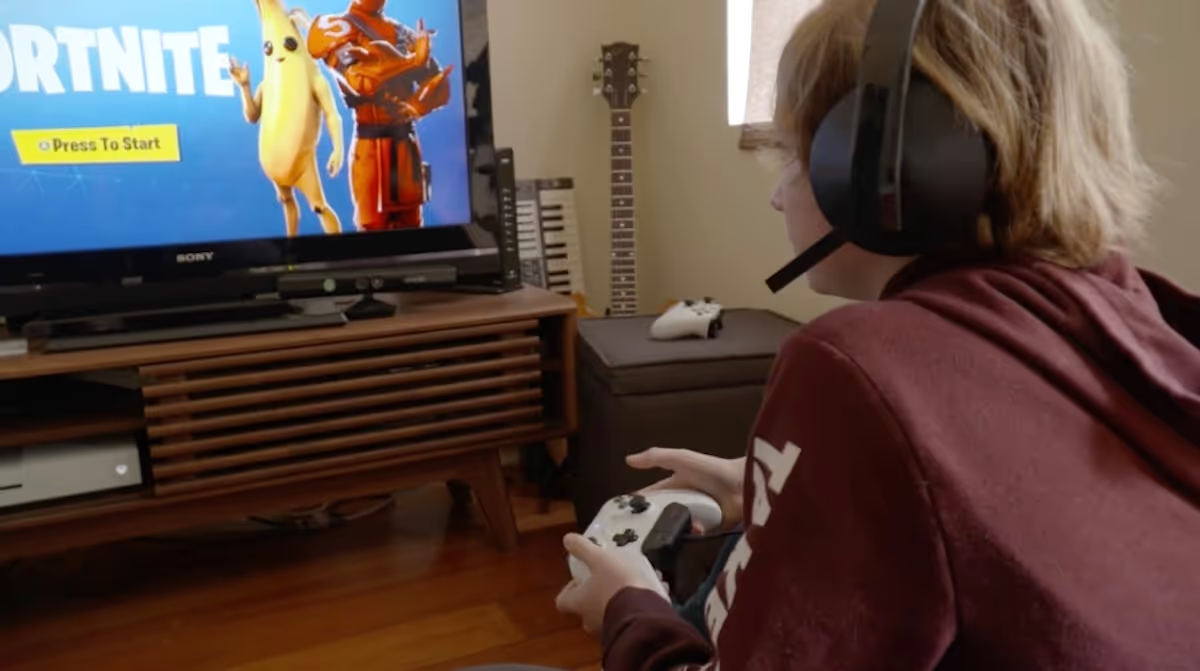


There is a lot of talk about cyberbullying, taunting, and blatant cruelty that happens on social media, but video gaming is another large arena where these things play out yet get much less attention.
I am excited to have just released a new Screenagers Podcast episode, Mean Behind the Screen, to address this topic.
In the episode, we hear from a teen about this experience. I talked with Dr. Kishonna Gray, an assistant professor of digital studies at the University of Kentucky who researches human dynamics in video game play. Dr. Gray shares many great pointers on how parents can help kids and teens navigate these complex dynamics.
Today’s blog highlights key points from my interview with Dr. Gray. The full interview, which has even more practical takeaways, includes insights from a gamer about bullying while gaming.
Have a listen, and if you share the podcast with even just one person, please email me and let me know. I want to thank you personally! Delaney@screenagersmovie.com
Listen Here: Apple Podcasts // Spotify // Youtube // Website
“Trash-talking is a thing,” Dr. Gray says. “The toxic language is a thing. So is a lot of the F word, the homophobic-like language, then the racist words. They're calling each other the N-word. They're also using very sexist language.”
“Now I know a lot of parents are like, Oh my gosh, I'm getting my kids out of there,” she continues. “Hold on, parents. Slow down.”
Dr. Gray works with parents and youth to help them navigate the hard parts of video game culture, like cyberbullying and offensive language.
Learn more about showing our movies in your school or community!
Join Screenagers filmmaker Delaney Ruston MD for our latest Podcast

Learn more about our Screen-Free Sleep campaign at the website!
Our movie made for parents and educators of younger kids
Learn more about showing our movies in your school or community!
Dr. Gray encourages parents to play video games with their kids. “What's important is to game with your kids,” she says. “Most parents won't do that. I don't know why. But I'm like, play with your kids. My kids have always allowed me inside their spaces. Now I give them privacy when they're with their girlfriends and stuff. Like, I know when to leave, but I know their core group enough because I was in there when they were 7 and 8 and 9. And so they've grown up with this same core group, so I know who they all are.”
But what if you’re not skilled enough to keep up with your kids? Fear not. Dr. Gray says having open communication and interest is an inroad. She says, “Not all parents have the skill set to play, and not all kids have the patience to teach their parents. So first, we have to be mindful of that. But I think there's another route, just having that relationship where talking about your day, did anything cool happen? And this is where it's important to know who their friends are.”
Knowing the details about what your kids are playing and who they are playing with will make conversing with them easier. Dr. Gray says if you don’t know anything about the games your kids are playing, Google them. Learn the terms, characters, and important things your kids care about, then talk to them about it. “It doesn't take that long to just Google the latest things that are happening inside Fortnite, Roblox, or Minecraft.
Listen to the episode here for more on my conversation with Dr. Gray: Apple Podcasts // Spotify // Youtube // Website. It is also an excellent episode to have kids and teens listen to.
Learn more about showing our movies in your school or community!
Join Screenagers filmmaker Delaney Ruston MD for our latest Podcast

Learn more about our Screen-Free Sleep campaign at the website!
Our movie made for parents and educators of younger kids
Join Screenagers filmmaker Delaney Ruston MD for our latest Podcast
With new videos posted every Tuesday and Friday, be sure to subscribe to our YouTube Channel! Here's our latest videos!
As we’re about to celebrate 10 years of Screenagers, we want to hear what’s been most helpful and what you’d like to see next.
Please click here to share your thoughts with us in our community survey. It only takes 5–10 minutes, and everyone who completes it will be entered to win one of five $50 Amazon vouchers.
There is a lot of talk about cyberbullying, taunting, and blatant cruelty that happens on social media, but video gaming is another large arena where these things play out yet get much less attention.
I am excited to have just released a new Screenagers Podcast episode, Mean Behind the Screen, to address this topic.
In the episode, we hear from a teen about this experience. I talked with Dr. Kishonna Gray, an assistant professor of digital studies at the University of Kentucky who researches human dynamics in video game play. Dr. Gray shares many great pointers on how parents can help kids and teens navigate these complex dynamics.
Today’s blog highlights key points from my interview with Dr. Gray. The full interview, which has even more practical takeaways, includes insights from a gamer about bullying while gaming.
Have a listen, and if you share the podcast with even just one person, please email me and let me know. I want to thank you personally! Delaney@screenagersmovie.com
Listen Here: Apple Podcasts // Spotify // Youtube // Website
“Trash-talking is a thing,” Dr. Gray says. “The toxic language is a thing. So is a lot of the F word, the homophobic-like language, then the racist words. They're calling each other the N-word. They're also using very sexist language.”
“Now I know a lot of parents are like, Oh my gosh, I'm getting my kids out of there,” she continues. “Hold on, parents. Slow down.”
Dr. Gray works with parents and youth to help them navigate the hard parts of video game culture, like cyberbullying and offensive language.
Dr. Gray encourages parents to play video games with their kids. “What's important is to game with your kids,” she says. “Most parents won't do that. I don't know why. But I'm like, play with your kids. My kids have always allowed me inside their spaces. Now I give them privacy when they're with their girlfriends and stuff. Like, I know when to leave, but I know their core group enough because I was in there when they were 7 and 8 and 9. And so they've grown up with this same core group, so I know who they all are.”
But what if you’re not skilled enough to keep up with your kids? Fear not. Dr. Gray says having open communication and interest is an inroad. She says, “Not all parents have the skill set to play, and not all kids have the patience to teach their parents. So first, we have to be mindful of that. But I think there's another route, just having that relationship where talking about your day, did anything cool happen? And this is where it's important to know who their friends are.”
Knowing the details about what your kids are playing and who they are playing with will make conversing with them easier. Dr. Gray says if you don’t know anything about the games your kids are playing, Google them. Learn the terms, characters, and important things your kids care about, then talk to them about it. “It doesn't take that long to just Google the latest things that are happening inside Fortnite, Roblox, or Minecraft.
Listen to the episode here for more on my conversation with Dr. Gray: Apple Podcasts // Spotify // Youtube // Website. It is also an excellent episode to have kids and teens listen to.
With new videos posted every Tuesday and Friday, be sure to subscribe to our YouTube Channel! Here's our latest videos!
Sign up here to receive the weekly Tech Talk Tuesdays newsletter from Screenagers filmmaker Delaney Ruston MD.
We respect your privacy.
There is a lot of talk about cyberbullying, taunting, and blatant cruelty that happens on social media, but video gaming is another large arena where these things play out yet get much less attention.
I am excited to have just released a new Screenagers Podcast episode, Mean Behind the Screen, to address this topic.
In the episode, we hear from a teen about this experience. I talked with Dr. Kishonna Gray, an assistant professor of digital studies at the University of Kentucky who researches human dynamics in video game play. Dr. Gray shares many great pointers on how parents can help kids and teens navigate these complex dynamics.
Today’s blog highlights key points from my interview with Dr. Gray. The full interview, which has even more practical takeaways, includes insights from a gamer about bullying while gaming.
Have a listen, and if you share the podcast with even just one person, please email me and let me know. I want to thank you personally! Delaney@screenagersmovie.com
Listen Here: Apple Podcasts // Spotify // Youtube // Website
“Trash-talking is a thing,” Dr. Gray says. “The toxic language is a thing. So is a lot of the F word, the homophobic-like language, then the racist words. They're calling each other the N-word. They're also using very sexist language.”
“Now I know a lot of parents are like, Oh my gosh, I'm getting my kids out of there,” she continues. “Hold on, parents. Slow down.”
Dr. Gray works with parents and youth to help them navigate the hard parts of video game culture, like cyberbullying and offensive language.

Games like Roblox and Fortnite, which are especially popular among younger video gamers, may seem highly appealing due to their free-to-play model. Of course, they are not truly free. Young people are powerfully compelled to purchase in game currencies using real money, which in turn are used to purchase virtual items like costumes (skins) and weapons. Learn more about how this works in practice and what we can do as parents to help guide our kids.
READ MORE >
For a long time, people have been talking about how video games might be linked to extreme acts of violence, such as school shootings. The fact is millions of youth have played violent video games, and far less than 1% will ever do any such acts of violence. Today I look at two studies that shed more light on the ACTUAL effects that violent games can have on youth behaviors.
READ MORE >for more like this, DR. DELANEY RUSTON'S NEW BOOK, PARENTING IN THE SCREEN AGE, IS THE DEFINITIVE GUIDE FOR TODAY’S PARENTS. WITH INSIGHTS ON SCREEN TIME FROM RESEARCHERS, INPUT FROM KIDS & TEENS, THIS BOOK IS PACKED WITH SOLUTIONS FOR HOW TO START AND SUSTAIN PRODUCTIVE FAMILY TALKS ABOUT TECHNOLOGY AND IT’S IMPACT ON OUR MENTAL WELLBEING.
